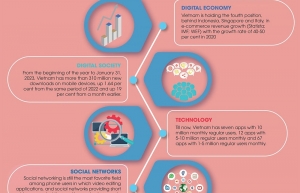AWS dreaming big for Vietnam’s cloud aspirations
AWS has launched two edge locations in Hanoi and Ho Chi Minh City. What benefits have local businesses gained?
 |
| Conor McNamara, managing director for ASEAN at AWS |
Cloudfront Edge locations are AWS data centres that deliver services with the lowest latency possible. Amazon has dozens of these data centres spread across the world and they are connected to the AWS region through the AWS network backbone. They’re typically closer to users than regions, often in major cities, so responses can be fast and snappy.
Industries that benefit from these edge locations are typically those that have to render or distribute dynamic media content, such as images and videos, to their users. Many businesses in Vietnam have benefited. For example Amanotes, VNG games, and even VTV have ultra-low latency content requirements that they want to get to developers or any sort of content consumers quickly, and edge locations are the solution for that. So, that’s why we built those because we are seeing a lot of demand in Vietnam.
I think the country has one of the highest penetration rates for smartphones in Southeast Asia. That is the reason we build edge locations. We’ve already preannounced an AWS local zone that will launch in Hanoi soon, which will provide customers the ability to access AWS services with single-digit millisecond latency.
Which economic sectors now have the best opportunity to adopt cloud technology?
First of all, we all know that in Vietnam or across Southeast Asia, over 95 per cent of businesses are small- and medium-sized enterprises (SMEs) and over 40 per cent of the GDP stems from them. We know that SMEs are not specifically focusing or resourced to build solutions from scratch but they’re going to be consuming cloud solutions.
Hence we have a solution-centric approach to digitalising this segment of the economy by working with service providers like SmartPay or TNEX that focus on developing cloud-based solutions for micro SMEs to help get them online.
If you look across all industries, AWS is not just about providing the broadest and deepest set of native services, but also important for us to create an environment where we have solutions for enterprises of all sizes and stages of their cloud adoption journey.
 |
| AWS’s Cloud Day in Hanoi earlier this month demonstrated the wide uses of cloud adoption |
For example, if you’re an enterprise and you want a call centre solution, you can choose from Amazon Connect as a native solution or you can use a third-party solution such as Genesys. If you’re an SME and you need a cloud-based point of sale solution, you can build it or you can buy it, and that’s how we’re aiming to support the broad base of SME customers on their cloud adoption journey.
On industry-specific sectors, every vertical is aggressively embracing the cloud. The case for change is strong here as the ambition is strong. If we look at the financial services industry, for example, we see that the only real way for some organisations in Vietnam to support their growth aspirations is through a cloud-centric operating model.
As you can see in our recent announcement with VPBank or the work we’ve done with Techcombank, the cloud is not just another data centre but they’re using the cloud to transform the way their organisations operate. They are migrating traditional applications and moving core banking to the cloud to support increasing transaction volumes, building new digital frontends to connect with an increasing digital-centric and mobile customer base, and building a new innovative culture to respond to the unknowns of the future.
We see the biggest opportunities where business leaders see the cloud as a way to transform their whole operating model, from reskilling to driving cultural transformation and creating an innovation DNA.
While the financial services industry is our largest and most progressed vertical right now in Vietnam, we’re seeing accelerated momentum across all industries. In healthcare and life sciences, for example, we’ve seen a huge growth in services such as telemedicine in response to the pandemic and we’re supporting the digital transformation of large hospitals across Southeast Asia, including working with organisations involved in public-private collaborations such as digitalising healthcare records.
Even in retail, we work with Grove Group, a logistics and distribution company that also operates their own a retail chain, on top of retail solution providers such as Boost and Merchize.
In line with this diversified growth, globally, we now have specific competencies by industry vertical such as Thought Machine, our financial services competency partner; and Amdocs, our telco competency partner. Locally, we’re focused on specialising our field organisation’s competencies into industry vertical expertise as customers seek more domain expertise.
Human resource training is now more important than ever amid the acceleration of digital transformation. How can AWS help to tackle this challenge?
Vietnam produces 80,000 IT graduates every year. This depth of fast-growing tech talents presents a huge potential in the market for upskilling and reskilling. Our approach to training is multifaceted and we adopt a working backwards approach.
In terms of training the next generation of technologists in Vietnam, AWS Academy is probably at its best where we embed AWS curriculum into higher education programmes. And we have around 23 higher education institutions in Vietnam that have signed up to AWS Academy.
We also have the AWS re/Start programme, which is a 12-week, skills-based training programme covering fundamental cloud skills and practical career tips, including interviewing and resume writing. Through real-world, scenario-based exercises, labs, and coursework, students with no prior experience in cloud computing learn Linux, Python, networking, security, and relational database skills.
We also provide them with access to potential employers, and that’s been successful. In Vietnam, one of our partners, Cloud Kinetics, has hired a number of graduates, and we’re definitely seeing a lot of momentum in that initiative, both in Vietnam and also across the region.
The pace of adoption in Vietnam has been beyond our expectations over the last few years with diversified growth, and so we are thinking about investing across multiple pillars. The local team that we invest in is not just salespeople, but individuals with cross-functional skills to support customers and partners on their journey.
Cloud transformation is a multi-year, multidimensional journey, and it requires lots of orchestration from the board and the chief strategy officer to the chief finance officer and beyond. As developers, it is a complex transformation journey. If you do not have a team on the ground that is willing to go on that journey, you will struggle.
We have over 7,000 partners in ASEAN and over 100,000 partners globally. If you look at organisations like Renova Cloud and TechX, whose migration competency is certified now, there is this whole network of born in the cloud partners in Vietnam that we’re investing in.
We’re very excited, and we’ll continue to invest in our partner community. We’re investing in infrastructure, service localisation, and training curriculum. Furthermore, we have launched over 60 courses which have been localised for Vietnamese. Being part of the local agenda is a massive part of our team’s mission, whether it is local teams, partners, training, certification, infrastructure, or services.
 | Developers forecast cloud use boom Businesses up and down the country are leveraging cloud computing, anticipating vast growth in the digital arena. |
What the stars mean:
★ Poor ★ ★ Promising ★★★ Good ★★★★ Very good ★★★★★ Exceptional
Themes: Digital Transformation
- Dassault Systèmes and Nvidia to build platform powering virtual twins
- Sci-tech sector sees January revenue growth of 23 per cent
- Advanced semiconductor testing and packaging plant to become operational in 2027
- BIM and ISO 19650 seen as key to improving project efficiency
- Viettel starts construction of semiconductor chip production plant
Related Contents
Latest News
More News
- A golden time to shine within ASEAN (February 19, 2026 | 20:22)
- Vietnam’s pivotal year for advancing sustainability (February 19, 2026 | 08:44)
- Strengthening the core role of industry and trade (February 19, 2026 | 08:35)
- Future orientations for healthcare improvements (February 19, 2026 | 08:29)
- Infrastructure orientations suitable for a new chapter (February 19, 2026 | 08:15)
- Innovation breakthroughs that can elevate the nation (February 19, 2026 | 08:08)
- ABB Robotics hosts SOMA Value Provider Conference in Vietnam (February 19, 2026 | 08:00)
- Entire financial sector steps firmly into a new spring (February 17, 2026 | 13:40)
- Digital security fundamental for better and faster decision-making (February 13, 2026 | 10:50)
- Aircraft makers urge out-the-box thinking (February 13, 2026 | 10:39)

 Tag:
Tag:


















 Mobile Version
Mobile Version